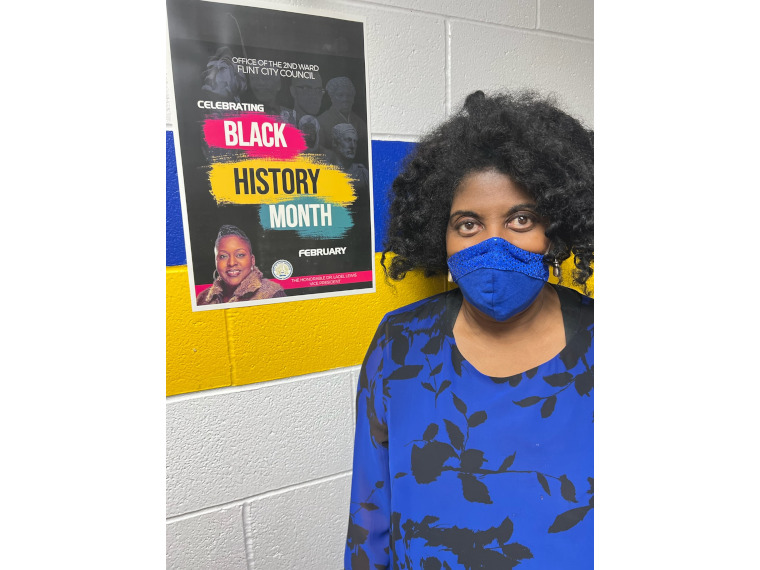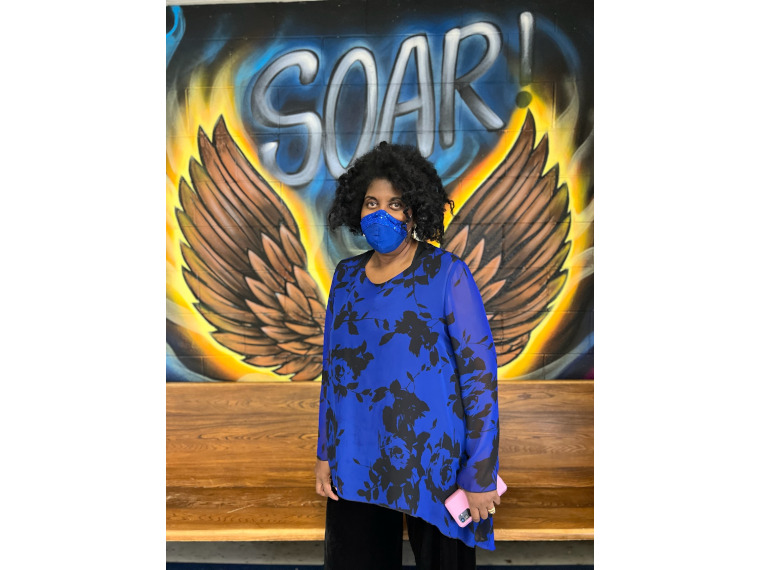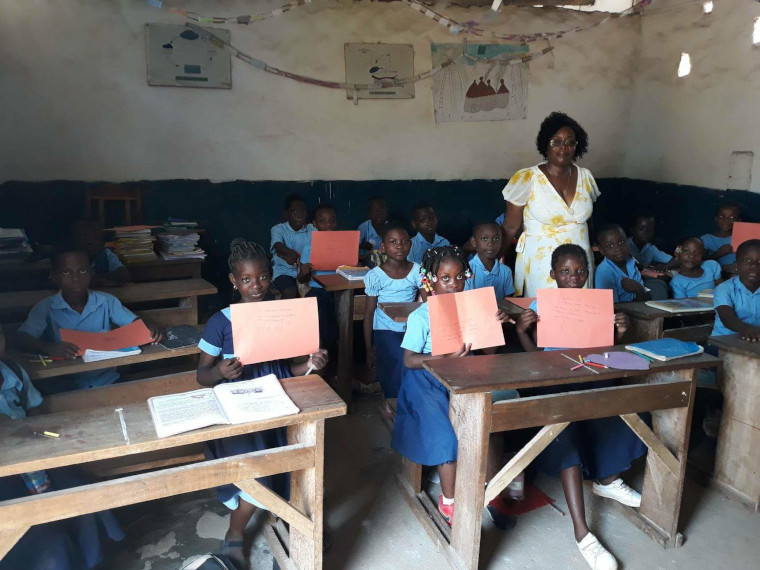Featured photo: Director Amevi Ahoucou with students of a school in Togo, West Africa. Students from the school will participate by video in an upcoming local poetry workshop and forum. Photos provided by Semaj Brown
Written by Tanya Terry
Semaj Brown, Flint’s inaugural poet laureate, recently talked to the Courier about how her “Black Dandelion” poem and the multimedia platform Black Dandelion: Covergent Voice continue to bring people together while celebrating uniqueness.
Brown, who is also an Academy of American Poets Laureate fellow, is currently engaging with four school classrooms.
“Black Dandelion Convergent Voice originated from PSL / POETRY AS A SECOND LANGUAGE: THE SEMAJIAN METHOD ™, explained Brown. “That is a pedagogy, a method of teaching, that I developed through three decades of being engaged in education.”
Brown has educated in classrooms, in organizations and in institutions. It seems to be in her blood.
“I have always been in some kind of education, and I’ve always used what we call now PSL / Poetry as a Second Language,” Brown stated.

Brown looks at the characteristics of poetry and applies them so one can enhance the experience of reading and writing and amplifying literacy.
All of the work Brown does is integrative. When Brown teaches, no subject is taught by itself. There is instead a melting of science, art, emotional intelligence and cognitive expansion across disparate genres. PSL / POETRY AS A SECOND LANGUAGE: THE SEMAJIAN METHOD ™ is designed to help ensure students understand literacy and words on both a personal and a communal/social level.
One way Brown does this is by creating synonym streams and synonym trees. When exploring words of interest, students also explore other words associated closely with each word’s meaning. This is done intentionally, according to Brown, so a student’s vocabulary starts to expand.
“We’re learning about water at the same time, and we’re learning how trees grow and expand,” said Brown. “If you look at the morphology of a tree, with its branches, you start to associate that with the shape of the lungs.”
There are five different frameworks Brown teaches to educators: topographic viewing, TI SI WI DI BI (think it, see it, say it, write it, do it, be it), morphology of thought, sequential disruption and pattern identification & relation.
Brown talked to the Courier about how one of the frameworks, topographic viewing, can be used to help students better understand the school-to-prison pipeline. The school-to-prison pipeline is the disproportionate tendency of minors and young adults from disadvantaged backgrounds to become incarcerated because of increasingly harsh school and municipal policies.
In topographic viewing, students can better see where they are placed in society so they will be motivated to strive to not become part of an inequitable system.

Brown noted the article “Dandelion Nation” was originally published in the Flint Courier News, which inspired “Black Dandelion.”
“Black Dandelion” was a poem that was sent all over the world to educators, written through the eyes of a young girl living in an inequitable world. Students from diverse backgrounds and different races wrote letters to Brown, telling her they identified with the Black Dandelion.
“That’s why I call it the Covergent Voice….It actually brings people together through the lens of this little Black girl during the Civil Rights Movement.”
Some of the letters written to Brown are published on the Academy of American Poets website, with an explanation of Brown’s program. Brown posted a link to the published letters on social media. This led to requests from California, Colorado and Togo, West Africa from teachers asking to initiate Black Dandelion: Convergent Voice in their classrooms.
Students and educators from Peckham Career Academy, Holmes 3-6 STEM Academy, Greater Heights Academy and Ecole Konoura in Togo, West Africa will soon participate in the Black Dandelion: Convergent Voice Poetry Workshop and Community Forum.
During the Community Wide Convergent Voice workshop, the community can expect to experience three panelists: Dean Withey, Sunanda Samaddar Carrado, PhD and Sonya Pouncy. Withey is the first African American dean in Flint to be dean of a major university. Pouncy is an engineer and will be looking at the engineering aspect of bees, dandelions and structures in society. Carrado, an anthropologist, will look at how women are dandelions.
There will also be table discussion at the event.
It all takes place from 2-4:30 p.m. Saturday, March 18 at the Flint Public Library.
Taking part in the action is Karen Utsey, Growth Opportunity program coordinator with Peckham Career Academy. Utsey explained the poem “Black Dandelion” really hit a chord close to the heart of Peckham students, who had recently lost a classmate due to gun violence. The little girl in the poem talks about how dandelions are her favorite flower, but they are constantly mowed down and viewed as an eyesore. The girl in the poem compares Martin Luther King, Jr., Malcolm X and the boy around the corner who was “mowed down” to dandelions. Utsey said the Peckham students choose to express their interpretation of the poem through painting, which they will share at the upcoming event.
“I always hope for transformation,” said Brown.
Brown is seeking funding for do additional work with students. Currently much of Brown’s work is being funded by Dr. James Brown, MD, Semaj Brown’s husband.
To read more about Black Dandelion: Convergent Voice, click here: https://issuu.com/1plflint/docs/colored_final_booklet_blackdandelion_mcte_color


